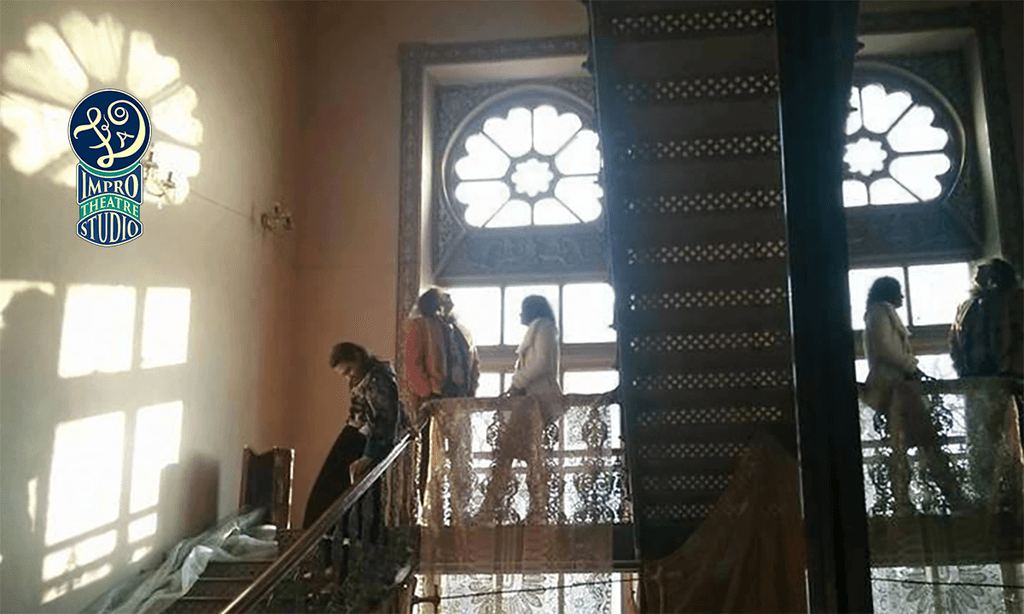
Theater Сoncept
We are modern ritual-dramatic theater. We consider human individuality consisting not only of emotions, intellect and body, but also of inner infinity, the space of the Spirit. In the Studio we develop intuitive-meditative approach to drama, which allows us not only to put on plays, but also to perform the Great Improvisation, where nothing is known in advance: the plot, the characters and the text actors find during the performance.

In the 2014 The Ministry of Culture included the Studio in the registry of professional theaters of Moldova.
In the 2016 our modern carnival “Chisinau Summer” was recognized as a tourist attraction by the Ministry of Tourism, which became Studio’s partner in realization of this project.
Studio Directors (and creative technique trainers): Vladimir Simanschi, Elena Cusnir
Studio Actors (and directors and dramatists of The Great Improvisation): Anjela Enachi, Natalia Jurminskaia, Iulia Pinzari, Natalia Zdibneac, Nicoleta Nagailic, Alexandru Volosin, Andrei Simanschi, Vladimir Simanschi, Vadim Eleni.
Scientific consultant Jozefina Cusnir, doctor habilitat in Philology, The Academy of Sciences of Moldova
International Festivals And Conferences Participation
“GOLD KHORTITSA”, Kurbas-Interfest-2007 (UKRAINE)
“Big Improvisation” in the courtyard of the theatre “Vie”, on the carpet from the hay and oak’s leafs. Carpet’s patterns cited in details the scheme of the Khortitsa’s Orphic sanctuaries. July, 1st
MOLDFEST.RAMPA.RU» 2015 (MOLDOVA)
“Gustav Mahler Boogie-Woogie”, improvisation on a given theme in an old Chisinau mansion
OITF, Odessa International Theatrical Festival 2016 (Ukraine)
“Impro Triptych”
Big Improvisation near the Teschin Bridge
Improvisation on a given theme (“Streams”) in the City Garden
Pastoral on the seashore
“Carnival Of Comediada”, First Festival Of Street Theaters IN ODESSA, 2018 (UKRAINE)
Impro-drama without words, “Conversations with the space”. Three novels on Deribasovskaia street. What story does this point of space and time want to tell? Spectators participate in the performance.
“Almanac of the Carnival Rituals”. Improvisational rituals on a given theme with the participation of the audience. Place of the performance – Deribasovskaia street, near “Passage”.
International Theatre Festival “Milk”, 2018 (UKRAINE)
Ark “Apokatastazis”. Impro-drama on a given theme. Ark – is the salvation for the chosen ones, Apokatastazis – is the salvation for everyone. Which variant would you choose? And how would salvation of everyone find its way into the world through life of every person?
International Conference “Direction Of Screen Arts, Innovations And Traditions”. Master Class On Methodology And Technique By Zao-Studio. Karpenko-kary Theatre, Cinema And Television University, 2019 (UKRAINE, KIEV)
International Plastic Art Festival “Extra Words”, 2019 (UKRAINE, KIEV) PRIZE IN NOMINATION “BEST PLASTIC PERFORMANCE”
Dramatic ballet number 2. Impro drama. A strong feeling is often conveyed in the dance. Can a dance express a subtle, elusive, complex state?
International Conference “Direction Of Screen Arts, Innovations And Traditions”. Speech On The Topic Of “genre Criteria�”. Karpenko-kary Theatre, Cinema And Television University, 2020 (UKRAINE, KIEV)
International Plastic Art Festival “Extra Words”, 2020 (Ukraine, Kiev)
Prize In Nomination “Best Plastic Performance"
”Dithyramb”.Dionysius online. Dramatic impro-stories without words. Spontaneous interpretation of the myth of Dionysus with the participation of spectators.
“Extra Words”
International Plastic Art Festival (Ukraine, Kiev), 2021
Gratitude from the Union of Cinematographers of Ukraine “For the best embodiment of a work on an ancient theme and active participation in the festival “Extra Words”.
Premiere of the video play “Sphinga + Oedipus”. Episode I of the online series “Fortune telling by masterpieces” (ZaO-Studio project). A game about the victory of Oedipus over fate with the help of Sphinga, based on the satyr drama of Aeschylus.
Experience Of Metaphysical Drama
Briefly about our concept
Greetings from planet Chisinau!
Impro Theatre Studio “ZaO” is a professional theater that has been developing metaphysics of drama and ritual-dramatic principles of performance since 2007. We are close to the concepts that date back to the discoveries of Antonin Artaud, Jerzy Grotowski, Eugenio Barba, Peter Brook and Klim.
As art is a spiritual process, it is interesting to consider a person as a whole: not only his physical, emotional, intellectual side, but also the subtle essence, infinity within us. It’s just the contact with the subtle essence what we call the ritual, meditation in the theater. By the way, in this case the ritual shines through in any laughing or purely dramatic form.
Intuition surely is well-known and vivid version of contact with infinity. An intuitive subtle impulse is the beginning of any act in life and art. Therefore, our developments are focused in the field of improvisation, which provokes intuitive insights. Improvisation is interesting to us precisely as the deep beginning of the theater, as an outlet to the metaphysics of drama.
Our meditative-analytic technique consists in actor’s reception and development of all the theatrical information - story, energy, awareness, emotions, actions - through a controlled meditative process, where the act of perception is not happening against intuition, but only with the help of it.
A person’s contact with his essence quickly turns into an open dialogue with the world since there are no fences and border pillars on the subtle level. We choose interesting interlocutors for this dialogue – places for performance, authors of literature pieces… For example, we played in the Chisinau’s mine, on the banks of the river Byk, on the roof of the eighteen-storeyed hotel National, at night in the blooming garden… We made plays on H.L. Borges, improvised around the masterpieces of H. Cortazar, T. Mann, Matsuo Basho.
Our ZaO Studio has a wonderful audience. Together with the audience, we perform drama and create new carnival “Vara Chişinăuiană” ("Chisinau Summer"). All over the world artists are looking for modern forms of carnival; in Chisinau, it turned into a joint artistic act of spectators and actors in the urban space.
Probably, the motto of our theater is "To be together and to observe miracles".
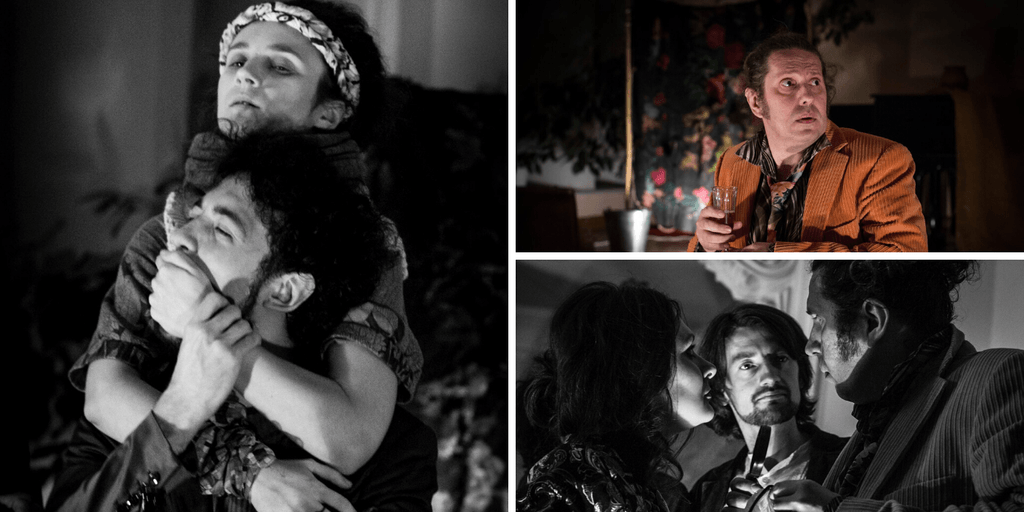
History Impro Theatre Studio ZaO
(Biography of the theatre and Repertoire)
2003-2007. Development of the concept and improvisation technique, education of the players.
Open rehearsals of the projects:
“El jardín de senderos que se bifurcan”/“The Garden of Forking Paths” (on the basis of Borges), V. Shimanskiy’s project, 2004-2005 years.
“Bashō. Short Travels.” E. Kushnir’s project, 2005-2006 years.
Place: ZaO-Studio’s nest, ballet hall in the lycée “Gaudeamus” (ZaO-Hall).
2007-2008. The first season. Birth of the Carnival.
Opening the ZaO-Studio in summer.
“Big Improvisation before Salvador Dalí/ coram Salvador Dalí” in the gallery “Brâncuşi”
“Big Improvisation in the Black and White (Fountain)”, (Stephen’s the Great park) on the 16th and 17th of June
Participation in the international theatrical festival “Gold Khortitsa”, Kurbas-Interfest-2007 (Ukraine)
“Big Improvisation” in the courtyard of the theatre “Vie”, on the carpet from the hay and oak’s leafs. Carpet’s patterns cited in details the scheme of the Khortitsa’s Orphic sanctuaries. July, 1st
So, generally our first season was carnival. In October there was small-scale carnival pass “The Chişinău’s Decameron”. December gave us drama “Big Leap Year Improvisation” in ZaO-Hall and emphasized the beginning of the repertoire. Since that very time performances was going every month. January burst into carnival named “The Collection of Rituals. The Eighth Winter”. In March carnival “The Corinthians. Spring Alchemy” dressed in red and white.
In April we again appealed to drama and played “Big Improvisation with Flowered Trees” in the open air. May led us to the centenary summerhouse spread with the wings of light spring trees. By the way, summerhouse is situated in the botanic garden of Ethnographic Museum and took up the place of Chişinău in this natural and climatic model of Moldova. Moreover, the first drama performance in Europe was called “Play in a Summerhouse” (13th century). This was we adopted. It happened in May and very resembled the modern drama. Adam de la Halle was the author of this French staging. We were invited to play into the summerhouse in honor of The International Museum’s Day on the 17th and 18th of May. This is not accidental coincidence.
Season was ending with summer carnival and performance “In Search of Hapi” on the bank of the river Byc. (There is such river…)
The first season helped us to cope with the street performances. They differ from carnivals both in play and set design. This is play in the open air. It doesn’t need clear ritual moments which give life to carnival, participation of audience or a lot of space in the wide carnival meaning. Although open contact with field carries carnival shade, reinforces creation as much as possible and cleanses participants.
2008-2009. The second season. Birth of the repertoire.
Repertoire structure as something natural and original whole began to form in December 2008. This was the season of dramatic play.
In December 2008 going after mythological sun’s trajectory we went down under ground in the Chişinău’s mine and played here “The Breath” (about Thomas Mann’s “The Magic Mountain”). Julio Cortázar with his passionate aspiration for light helped us to come out. There were performance by “Hopscotch” and improvisation “Good Bye, Yanus!” in the “44 Jazz Café” on the 31st of January 2009. Then we walked up the stairs of the local history museum (“Big Improvisation”, March, 14), climbed on the hotel’s “Naţional” roof (“The Corinthians” March, 29) and after found ourselves in the blossomed apple orchard together with Borges (“The Garden of Forking Paths”).
Just that very way on the level of history and travels was formed our second season and first repertoire.
Repertoire Performances of the ZaO-Studio
Authors and directors: Vladimir Simanschi, Elena Cusnir
Actors: Anjela Enachi, Natalia Jurminskaia, Iulia Pinzari, Natalia Zdibneac, Nicoleta Nagailic, Alexandru Volosin, Andrei Simanschi, Vladimir Simanschi, Vadim Eleni, Sergei Reulet.
Bashō. Short Travels.
It was included in the repertoire in December 2008. This is a ritual and dramatic cycle composed of 11 solo performances. This is an improvisation according to the Matsuo Bashō’s texts. He lived and died on way. His travels couldn’t be named short but tercets hokku he created was the short road to the eternity. What are the dramatic histories that reveal in the Bashō’s space? Nevertheless this project embraces poetry on all seasons it mostly rises to the autumn which gathers and reflects all seasons.
The Breath.
Improvisation on Thomas Mann’s “The Magic Mountain”
From December 2008 it is in repertoire. On the 13th and 14th of December “The Breath” was played in the Chişinău’s mine. It was an extraordinary travel following the Sun into the underground depths. There was immersion deep into the heart of dramatic situation, acquisition of light and going out. “The Breath” is a winter performance as the winter conforms to the yin entry.
Suddenly I Saw.
Improvisation on the theme of Julio Cortázar’s “Hopscotch”
This performance was included in the repertoire in January 2009. First night was played in the “44 Jazz Café” by the name “Good Bye, Yanus!” on the 30th of January. In our opinion the main theme of the novel is also the main Chişinău’s theme, especially the higher necessity to achieve the solemn reality and the unpredictable ritual ways of its acquisition. There were two independent performances connected with common theme into two different halls. These two plays were sometimes closely interwoven, so in some cases stages were exchanged.
Impro Triptich, or Everything of Nothing
Part One. “Great Improvisation".
In this project nothing is known in advance (story, characters and text are found by actors during the performance). So every time it is new performance which audience names after. For example, our plays were named “Amsterdam’s Christmas”, “Failed Murder in the Lotus Position, or Eight Dance Classes”, “The Japan Travel of Dostoevskiy/ Dostoevskiy in Japan”, “The Portrait without Pipe/ The Free of Pipe Portrait”, “One More (Life)” and etc.
Part Two. “Improvisation on a given theme”.
The story is offered by the audience, actors interpret it unpredictably in the performance. Even when we know something, the mystery still remains our pivot point. May be, that’s just what Socrates had been talking about: the more you know, the wider are the borders of the unkonwn.
We can also borrow the theme from a novel, a great piece of poetry or from entire cultural epoch (for example, in the "Gustav Mahler Boogie Woogie" performance we worked with the atmosphere of old Chisinau and the issues of the epoch of modernity). Sometimes we study the subject in advance and work on its improvisational development.
Part Three. “Pastoral”.
The driving force of such an improvisation is not a conflict, but the contemplation of the mysteries of life, revealed to us in the performance.
That’s one of the possibilities to get used to living in eden again.
Author of the project “Pastoral”: Vladimir Simanschi
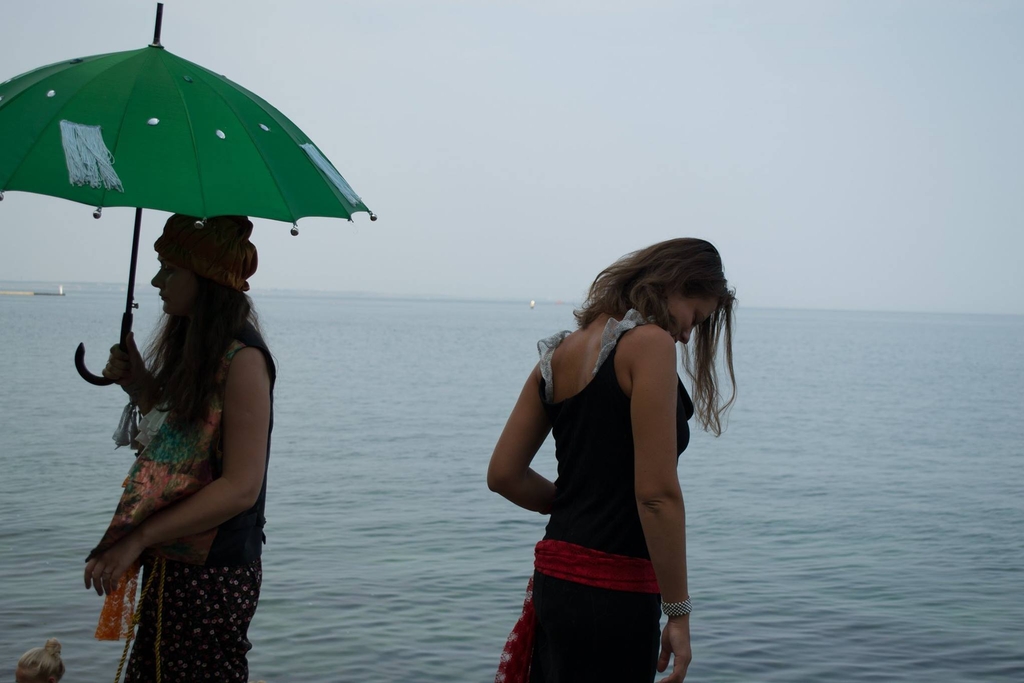
"Stories without words"
Ritual-dramatic improvisation is an unexpected encounter with unexpected meanings of theatrical acting. If the meaning exists, you can touch it any moment. Both in the life and in the art. Because it’s not only us seeking for mystery, it’s also mystery seeking for us. Performance can be with or without words. Some special meanings are born without words. If according to Pina Bausch…
This performance is not a pantomime, but a metaphysical drama.
We improvisationally research the territory of non-verbal communication to reapproach the word, going from silence. What depth could be revealed in a silent ritual-dramatic communication, what stories could be told using universal language of interpersonal relationships?
Author of the project and director: Vladimir Simanschi
The Corinthians. Apostle Paul, Revelation of Love.
“The Corinthians” became part of the repertoire after they were played in The Spring Carnival on the 29th of March 2009. This is a collage of several one-actor performances played simultaneously and turned into one common improvisation. The lyric of Apostle Paul, revelation of love as the world’s basis (the 13th chapter of the “Epistle to Corinthians”), is the only one you can hear in the performance. For the first time it was played on the roof of the hotel “Naţional” with the unforgettable participation of heavy wind as a drama. This is, of course, a spring play but we want to see Apostle Paul speaking with Bashō. Once this performances should be played one after another. In spring or in autumn it doesn’t matter.
The Garden of Forking Paths.
In spring 2009 Borges returned to the repertoire with the stage performance on the Borges’ story “The Garden of Forking Paths” that includes the elements of improvisation. It was the Borges who gave the birth/start to open repetitions in 2005.
“The Garden” is a brilliant metaphysical novel standing at one line with Pushkin’s novel in verses and Gogol’s poem in prose. Borges suggested the main theme of a play concluded in everyone’s essential choice happened continually. You have right to accept your inner eternity or no. We try to meet with flowering trees in this play as the acceptance is in some way the flowering.
In May 2009 we played in the blossomed apple yard in the rain on the natural stage of the film studio “Moldova-Film”. This performance was in memory of Yuriy Shirshilin, an actor who had participated in its development.
Borges may easily travel in time. We can play “The Garden” at the every moment we want.
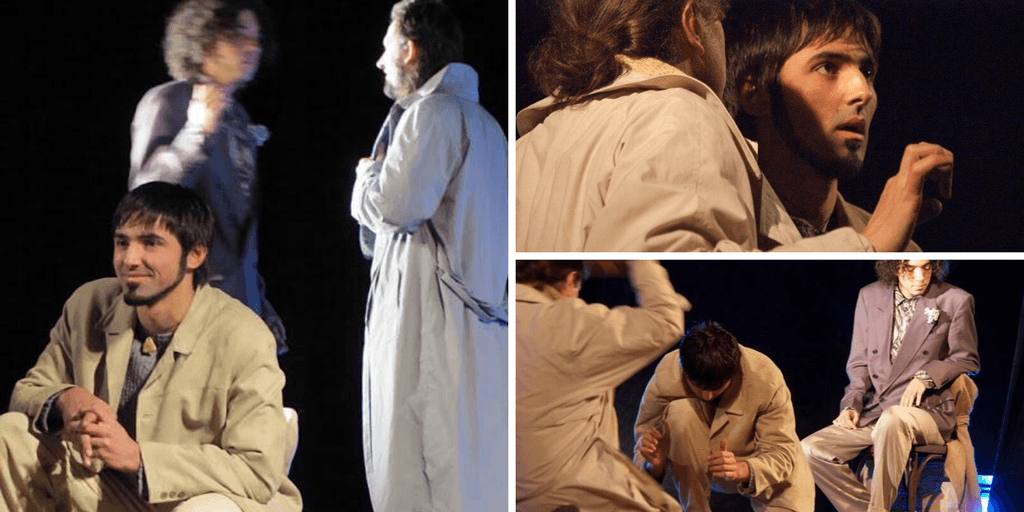
Summer.Time
Improvisation “Summer.Time” corresponds to summer. Firstly we have played it in Alchedar at the art-festival “Art-Labyrinth” between the rock and house both magnificent and attentive.
Summer is the paradise on earth that must be opened to a successful end but not every time opened. Then summer goes out. And paradise remains.
The main themes of summer improvisation are the possibility of happiness, the delicacy of happiness and the eternity of it. This is a dialog with time and space about happiness.
The theme has grown from three songs you can hear in the performance’s soundtrack. Ella Fitzgerald singing “Summertime” in 1958 is a gold silence of heaven coast; Janis Joplin singing “Summertime” in 1968 is on the very brink of tragic openness. In 1968 it was the Fitzgerald’s answer that one half was sung in her own vein, another as a Joplin’s variant and all this live together.
"The Actors Watch, The Spectators Play"
Spectacle Which The Spectators Play
Free Actor’s Master Class And Practice - For 5 Hours
First Day: Playing Children
Second Day: Playing Adults
Big Adventure
Little Artistic Act
Come To Training
And Play Now
In Unpredictable Deep Draft
Together With Other Spectators-actors
Annual Carnival “Chişinău’s Summer”
Summer season may perfectly match with classical essence of carnival play that Mikhail Bakhtin opened again in the 20th century and that we try to put into practice in Chişinău. Here and now we have Golden Age, paradise on earth, the very moment of the tightest embraces one with the whole world. This is the frank invasion of perfection.
This one very being we decided to display within the city limits through the “Chişinău’s Summer”. Firstly it was in 2009.
The main theme of carnival rituals was the summer happiness. The summer is the time of maximum light that we are out for but accept once in a blue moon. As we need not only to accept, but also to use. At first we do this in the carnival movements – actions, then in life. Changes happen if you make something in your life on the tide of maximum lightness. And even more than you can imagine. And if such acceptance and realization take place on the street and for all together then it easily happens for everyone separately. However, this is an experience.
Carnival actors-spectators, who visited School’s trainings during July, played in the city between three passes (Morn, Day and Eve). They opened gate of the carnival and were flying in its flashes as swallows do in the summer heaven’s temple.
Carnival according to Bakhtin is possible. Moreover it lives in our city. State of people and space was unimaginable we could only dream about.
After three days we need to carry out the meditation on the predestination, on the fulfillment of our wishes. There was so much energy that we had to make specialized work for its realization. Now it’s all right… But we had to make these our wishes come true. However, some of them have already become true.
Carnival Abundance 2007-2008
(Carnival’s Summary)
As we know there was not carnival in Chişinău though it lives in the Moldavian villages. ZaO-Studio has begun to work out the modern models of Chişinău’s carnival purposeful since the autumn 2007. As a result we have understood that carnival can be played not only once a season but in every season. Probably it means from our dialogue with the city that if the holiday exists in general it will be at any time. Quite so!
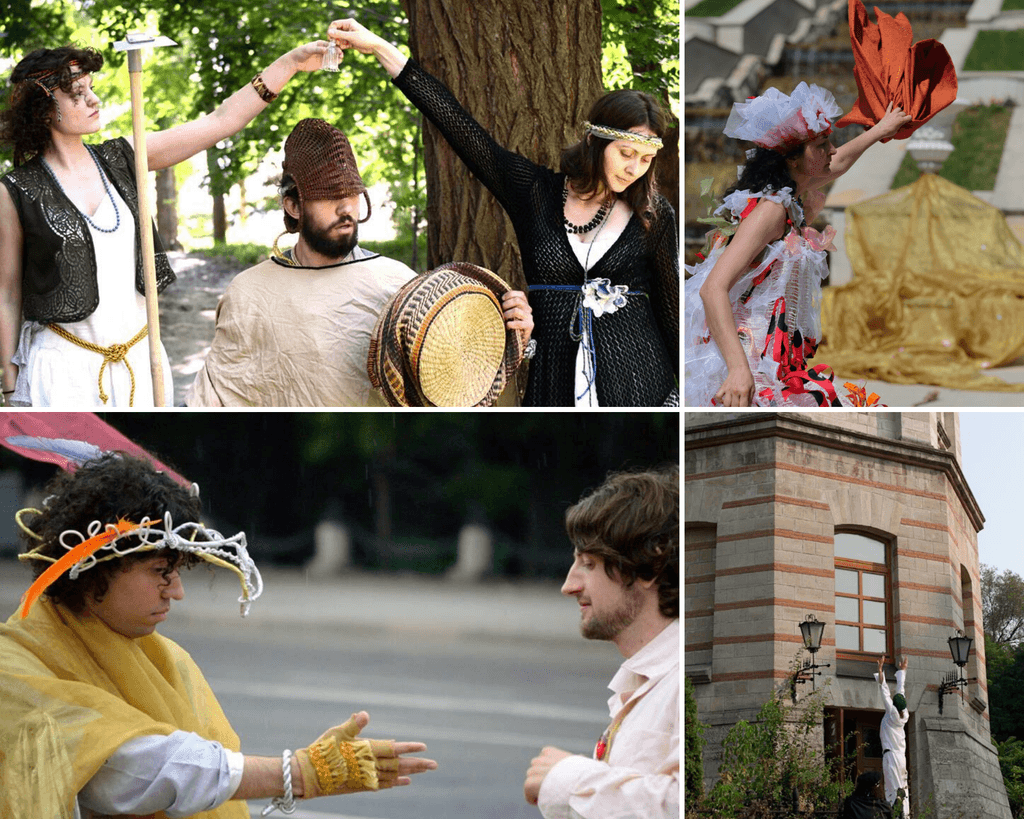
2007 – Carnival Début
There was small-scale carnival pass “The Chişinău’s Decameron” (10 stories set free of death). On the 14th of October during the City’s Day pass spread out the central street and parks stopped for an improvisation.
2008 – Year of Four Carnivals
Winter. “The Collection of Rituals. The Eighth Winter”. Conversation with Malanka (Moldavian country’s carnival) on the theme concerning Christmas and Eleusinian Mysteries devoted to the Demeter’s smile. 9th, 11th and 13th of January 2008: first play – in the Lower City, second – in the City Core, third – in the Upper City.
Spring. “The Corinthians. Spring Alchemy”. On the 22nd and 23rd of March 2008. (The School’s Birthday inter alia). This carnival originates in Mărţişor. Moldavian red and white monad (yin-yang) in combination with the Apostle Paul’s text about love. This text played firstly in yin’s central park (Stephen’s the Great Park), then in yang’s park (Cathedral Park). Crossing from one park to another over the central street and improvisation under Triumphal Arch were not very large but very impressive.
Summer. “In Search of Hapi”. On the 2nd of August 2008. Pass with the figure of transparent Bull from the Upper City through the Lower to the river. This was the kind of restoration of communication between the city and the river. There on the river we played the performance about the opening of the perfection’s flower. It will open if you ask.
In the Chişinău’s summer carnival appeal for the rain (Peperuda) became the appeal for the river’s return. River is a movement so necessary for our space. This is a continuously running road, an incessant way.
Autumn. “Play with Veil”. The 14th of October 2008. On the City’s Day we tried to awaken possibility of the universal creation on a city’s scale. Our Heralds gave carnival costumes for all comers. ZaO-Studio provided with properties with which spectators could play their small rituals, however it seems, that they were not interested in carnival.
Then there was an actor’s play on the Cathedral Square, pass with the Veil and actor’s improvisation on the Pushkin’s hillock.
The first play had the name “Scream” and the second – “Home”. These two performances had a common theme which developed non-linearly and unpredictably and was originated in the Protecting Veil – rescue of the city.
The main carnival abundance of the 2008 year is a sense of authentic Chişinău that is wanted to visit again and again. This city is full of white light (you can see it in the summer morn). At the same time silence and stream live together.
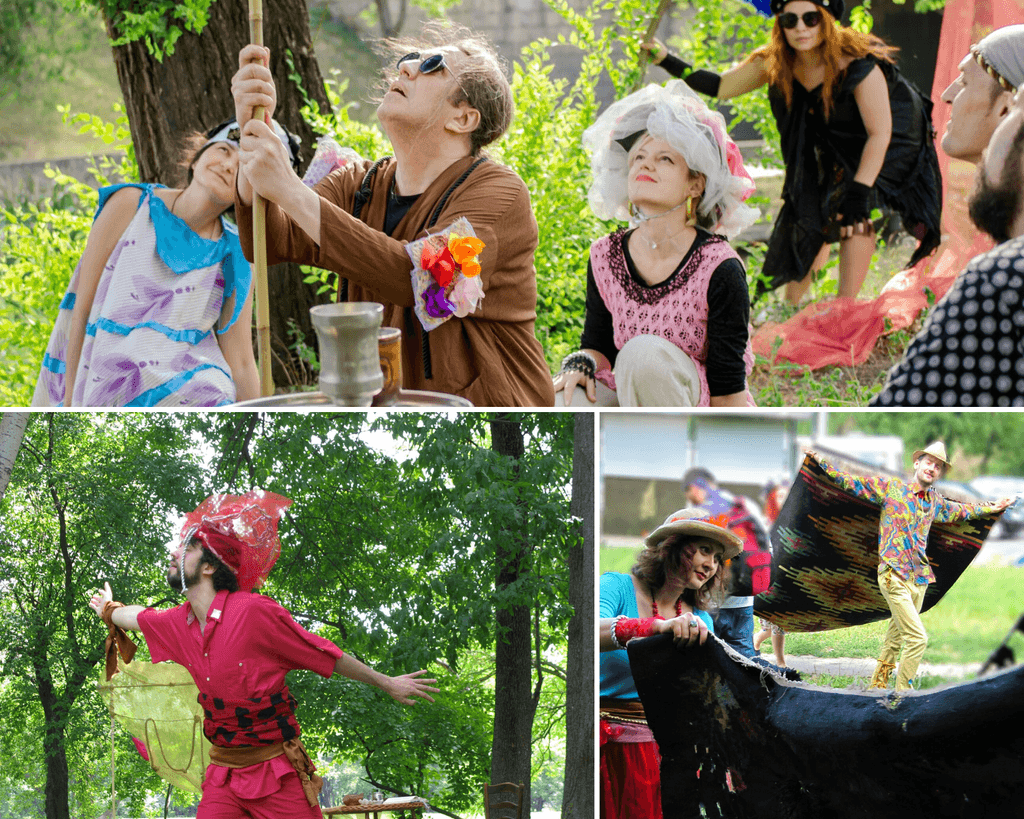
”Dithyramb”
Dionysius online. Dramatic impro-stories without words. Spontaneous interpretation of the myth of Dionysus with the participation of spectators.
To be continued...